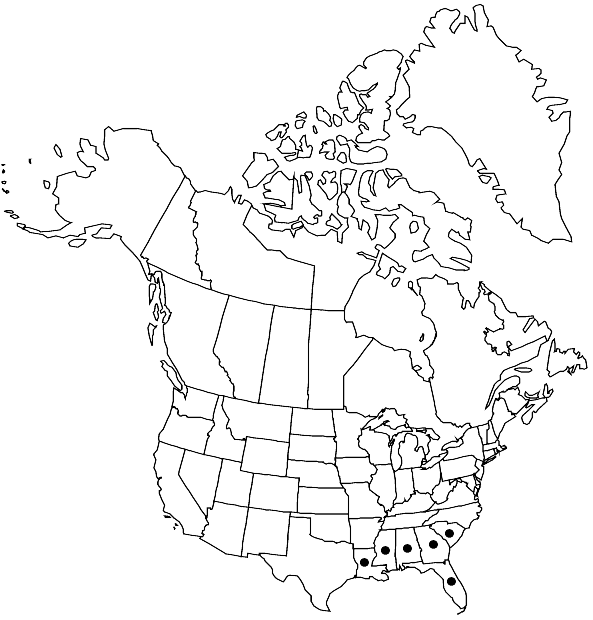Dicranella hilariana
J. Linn. Soc., Bot. 12: 31. 1869,.
Plants 3–8 mm, yellow-brown to dull green. Leaves erect-flexuose to subsecund, 1–2 mm, narrowly lanceolate, gradually tapered to a narrow, blunt or rounded, usually serrulate tip; margins ± recurved, often strongly so; costa subpercurrent, sometimes ± rough abaxially above, about 1/4 the leaf base; cells subquadrate to short-rectangular. Sexual condition dioicous. Seta yellow becoming brown or reddish with age, 5–7mm. Capsule erect and symmetric, oblong-ovoid to subcylindric, 0.8–1 mm, smooth, usually ± contracted below the mouth when dry and empty; annulus compound; operculum long-rostrate, inclined, about as long as the urn; peristome teeth 250–290 µm, divided more than 1/2 length distally. Spores 16–20 µm, finely papillose.
Phenology: Capsules mature late summer.
Habitat: Moist clay on ditch banks at low elevations
Distribution

Ala., Fla., Ga., La., Miss., S.C., Mexico, West Indies, Central America (Belize, Costa Rica, Guatemala, Honduras, Panama), South America (Brazil, Peru).
Discussion
Distinctive features of Dicranella hilariana include the yellowish seta, erect, smooth capsule, short leaf cells, and leaf tips that are often blunt and crenulate. The species is subject to considerable variation in length and thickness of cell walls, which vary from subquadrate, this often only at the tips of leaves, to long-rectangular or, even linear owing to thickened side walls. The setae are yellow, but with age they take on a dull brownish or even a reddish hue. Various names have been used for plants with short laminal cells, those with somewhat longer, thin-walled cells, and those with cells linear because of thick and often golden walls. As suggested by the large number of synonyms, differences are at best trivial and completely intergradient. The South Carolina report was by H. A. Crum and L. E. Anderson (1981).
Selected References
None.